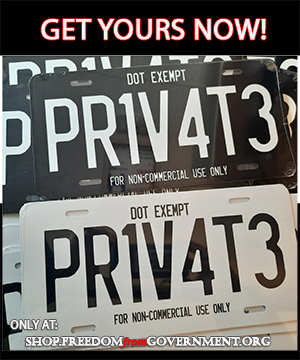There’s nothing wrong with being in an automobile, there’s nothing evil about that. Even man’s law, in their own court cases, admit that there’s nothing inherently evil about an automobile; it’s the guy behind the wheel. That’s where the evil comes from. Also, most people believe that “roads” belong to the government. They don’t. Just because the government paves over a way common to all does not make it theirs. After all, if the government comes to your home and paves your dirt driveway, does that now mean the driveway belongs to the government? Of course not. And their own laws confirm that the “roads” belong to the people, not the government.
The first thing to understand is that all codes, rules, and regulations that ‘govern’ the areas of transportation apply only to natural persons, residents, corporations, and other fictitious entities. They do not apply to the servants of Christ. Notice that the traffic laws of a State only apply to those who are residents or travelers within that State, and not to foreigners, transients, or sojourners:”The sovereign authority can extend only over those who are subject to it; it cannot, therefore, regulate the rights of foreigners. But if they come within its territory, either to reside or travel, they are considered as submitting themselves to the authority of the laws of the country, and they are bound by them. This is perfectly reasonable, for during their stay in the country they are protected by its laws.” 1 Bouvier’s Inst. of law (1851), page 38.
Notice that to ‘travel’ is synonymous with being a ‘resident.’
“Within the meaning of ‘a right to travel’, means migration with intent to settle and abide.” Strong v. Collatos, D.C. Mass., 450 F. Supp. 1356, 1360.
“Nom de guerre – a war name; an assumed traveling name; a pseudonym.” Webster’s New Twentieth Century Dictionary, Unabridged (World Publishing Company, 1969); Dictionary of Foreign Words and Phrases, page 1202.
‘Traveling’ and ‘driving’ are purely commercial terms. Therefore, you should use the term “exercising my duty of movement on the Common Ways”. As Scripture says, “I can do all things through Christ which strengtheneth me” (Philippians 4:13). Only in this way can you bring God’s Law and your ambassadorship into a potential situation with the military police. Also notice that a Nom de guerre, a fictitious name, is a ‘traveling name’, meaning you are a ‘resident,’ and under the jurisdiction of the State.
When you carry a license (which always has a fictitious name spelled in all capital letters on it), you are looked upon by these powers as one of theirs. It is evidence of your status, as a natural person, a resident, and not an ambassador and sojourner in Christ. The primary evidence of who and what you are is found in how you conduct yourself when confronted by the ‘road patrol’.
The police have the ability to use their discretion. If they feel that you are speaking the truth as to who and what you are (Matthew 12:37, “For by thy words thou shalt be justified, and by thy words thou shalt be condemned.”) and are not a threat to the peace and safety of the public, they may respect those convictions and let you go. Or, they may take you to jail and impound your vessel, or they may not. It may appear to be a negative experience for one that decides to take this stand, but appearances can be deceptive. The important thing to remember is that it is for the Lord’s sake; therefore:Hebrews 13:5, “Let your conversation be without covetousness; and be content with such things as ye have: for he hath said, I will never leave thee, nor forsake thee.”







ulyssesstephengrant@gmail
slave patrols